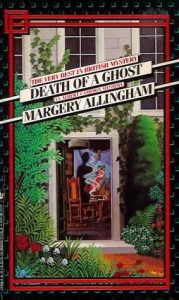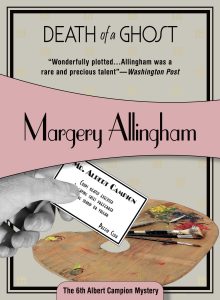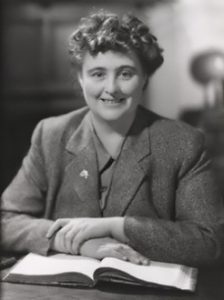“There are, fortunately, very few people who can say that they have actually attended a murder.” (Allingham 9)
In Death of a Ghost by Margery Allingham, artist John Lafcadio decides to keep his memory alive by creating twelve paintings and having one unveiled per year after his death. Up until now, these reveals have gone smoothly. However, at the latest reveal of one of his paintings, his family and friends attending the opening are horrified to discover that a murder has been committed in their midst. Fortunately, Albert Campion is also on the scene, and already has his suspicions about the identity of the murderer.
The book takes a closer look at the art world community in London. Though typical cozies are set in a small village, the art world is described as such a microcosm that Death of a Ghost fits neatly within the genre. Through the third person omniscient narration, readers are able to be given a glimpse into the minds of several characters, rather than being restricted to just Campion’s perspective. It even allowed readers to follow the actions and thoughts of the second murder victim throughout the day. This was refreshing, as well as a hook to keep the reader interested and looking for clues along the way.
When the book did follow Campion’s train of thought, it showed him to be a relatable character, as well as demonstrating his thought process. Perhaps uniquely, Campion’s thoughts about the murder are not hidden from the reader; instead, the reader is able to follow his thoughts and reach the same conclusion as the detective. Because of this, the murderer is named fairly early in the book, as the reader sees into Campion’s head and knows whom Campion suspects, as Campion almost instantly has a suspicion of the murderer’s identity. What is also different in this mystery is that, while he is convinced of the suspect’s guilt, Campion has no hard evidence to convict the murderer. Instead, he simply knows that the person is guilty by looking at them, and spends the rest of the book attempting to discover why the murder was committed and find some way that the murderer slipped up in covering his tracks, as well as how he knows that person is guilty. As Allingham describes it after the second murder,
“Mr. Campion knew that xxx had killed xxx as soon as he saw them that evening. He did not arrive at this conclusion by the decent process of quiet, logical deduction, nor yet by the blinding flash of glorious intuition, but by the shoddy, untidy process halfway between the two by which one usually gets to know things.” (99-100)
Overall, Campion is effective as a detective, and endearing as a character. His clear understanding of human nature allows him to follow the mystery to its twisty end, even endangering his own life in pursuit of bringing the criminal to justice. Originally a minor character in Allingham’s first book, The Crime at Black Dudley, Campion rose to be the main detective in following novels, due to readers’ reactions to the character, and I can see why.³ I instantly liked him, as he seems to be the sort of person I would enjoy having a long conversation with, as he is both very smart, but also humble and kind. He’s quite different from Agatha Christie’s distinguished Poirot or Ngaio Marsh’s respectable Alleyn, but Albert Campion holds his own in the cozy genre, justifying his place among other notable fictional detectives.
Death of a Ghost is considered a British cozy, but unlike other cozies, the stereotype of the “bumbling policeman” is absent. In contrast, the main police officer, Campion’s friend Inspector Stanislaus Oates, is also convinced of the murderer’s guilt, but like Campion, lacks the evidence to arrest him. He also values Campion’s intuitions in the case, rather than dismissing Campion as a mere amateur, as he thinks to himself when realizing that his own suspect is a person that Campion dismissed immediately,
Something in Mr. Campion’s manner had made him slightly uncomfortable, however. In the last case they had worked on together, Mr. Campion’s fantastic theory had been correct, and the inspector, who was a superstitious man in spite of his calling, had begun to regard his friend as a sort of voodoo who by his mere presence transformed the most straightforward cases into tortuous labyrinths of unexpected events. (43)
Though Oates may sigh at Campion’s theories throughout the novel, as they do continue to be fantastic, he trusts Campion, and their good working relationship adds to the novel’s charm.
Because the identity of the murder is made clear early on in the novel, Death of a Ghost is less of a whodunit than a howdunit. It is Campion’s own charm as a character and as the detective, in addition to the well-rounded characters that compels a reader to keep turning the pages. Allingham does a thorough job in delving into the psychology of her characters, making each person come alive on the page. The characters are central to the plot of the novel, for Campion must unravel each person’s jealousies in order to get to the bottom of this mystery. There are many eccentric characters, such as Donna Beatrice, who is theatrically dramatic and draws the center of attention around herself. Equally important in the novel is Bella Lafcadio, widow of John Lafcadio and friend of Albert Campion, who was at the opening on her invitation and looks into the murder at her request.
There is no exact theme to the novel, but the psychological nature in which Allingham elegantly weaves her story is worthy of being noted.³ Like her contemporaries Agatha Christie and Dorothy L. Sayers, Allingham has a keen insight into human nature. This is exemplified in the novel,
There is an optimistic belief widespread among the generous-hearted that the average human being has only to become sufficiently acquainted with another’s trouble or danger to transfer it to his own shoulders not merely unhesitatingly but gladly. The fact remains, of course, that the people who say to themselves, ‘There is real danger here, and I think it had better confront me rather than this helpless soul before me’ are roughly divided into three groups.
There are the relatives, and it is extraordinary how the oft-derided blood tie decides the issue, who, moved by that cross between affectation and duty, perform incredible feats of self-sacrifice.
Then there are those misguided folk, half hero, half busybody, who leap into danger as if it were the elixir of life.
And finally there is a small group of mortals who are moved partly by pity and partly by a passionate horror of seeing tragedy slowly unfolded before their eyes, and who act principally through a desire to bring things to a head and get the play over, at whatever cost.
Mr. Campion belonged to the last category. (150)
Allingham’s ability to neatly sum up human nature in a few short paragraphs speaks to her ability as a writer, as well as why this novel has stood the test of time, with it still being read today by mystery lovers everywhere.²
Death of a Ghost is Margery Allingham’s sixth novel featuring her detective Albert Campion and demonstrates her maturity as a writer through the novel. Allingham is often listed with Agatha Christie, Dorothy L. Sayers, and Ngaio Marsh as being one of the “Queens of Crime” during the Golden Age of mystery. Dorothy L. Sayers herself praised the novel and the quality of Allingham’s writing in her review for The Sunday Times, saying,
“I think Miss Allingham gains by this versatility. Her thrillers are the more convincing for the habit of accuracy imposed on her by detective writing, and her more intellectual problems enlivened by the sense of colour and movement that invades them from the thriller side of her mental make-up. This would not happen to anybody but a very good writer, and her writing is, in fact, excellent.”³
As Sayers is a respected crime fiction novelist in her own right, in addition to being a crime critic, this speaks highly of Allingham’s ability as a writer within the British cozy genre.
Some of Allingham’s novels have been turned into a TV show; Peter Davison (who is famous for his portrayal of the Fifth Doctor in the British series Doctor Who) starred as Campion in the BBC adaptation of the novel in the TV show Campion.²
Overall Reaction
Overall, while the plot was not as thrilling as some of the other cozies I have read, with most of the action occurring at the end of the novel, this book kept my interest and I was rooting for Campion to be able to catch the murder. In all, I would give this novel 4.5/5 stars and would definitely read it again. If you like curling up with a good British cozy, cup of tea in hand, then you would enjoy Death of a Ghost.
References:
1. Allingham, Margery. Death of a Ghost. Penguin, 1986.
2. Keating, H.R.F. “A Writer to Remember: Margery Allingham.” Mystery Scene, Spring 2004.
3. Pike, B. A. Campion’s Career: A Study of the Novels of Margery Allingham. Bowling Green
State University Popular Press, 1987.
4. Shaw, Marion and Vanacker, Sabine. Reflecting on Miss Marple. Routledge, 1991.
5. Woods, Paula M. “Margery Allingham.” Great Women Mystery Writers, edited by Kathleen
Gregory Klein. Greenwood Press, 1994, pp. 13-17.
6. —. “Margery Allingham.” Mystery and Suspense Writers: The Literature of Crime, Detection, and Espionage, edited by Robin W. Winks. Charles Scribner’s Sons, 1998, pp. 1-12.




